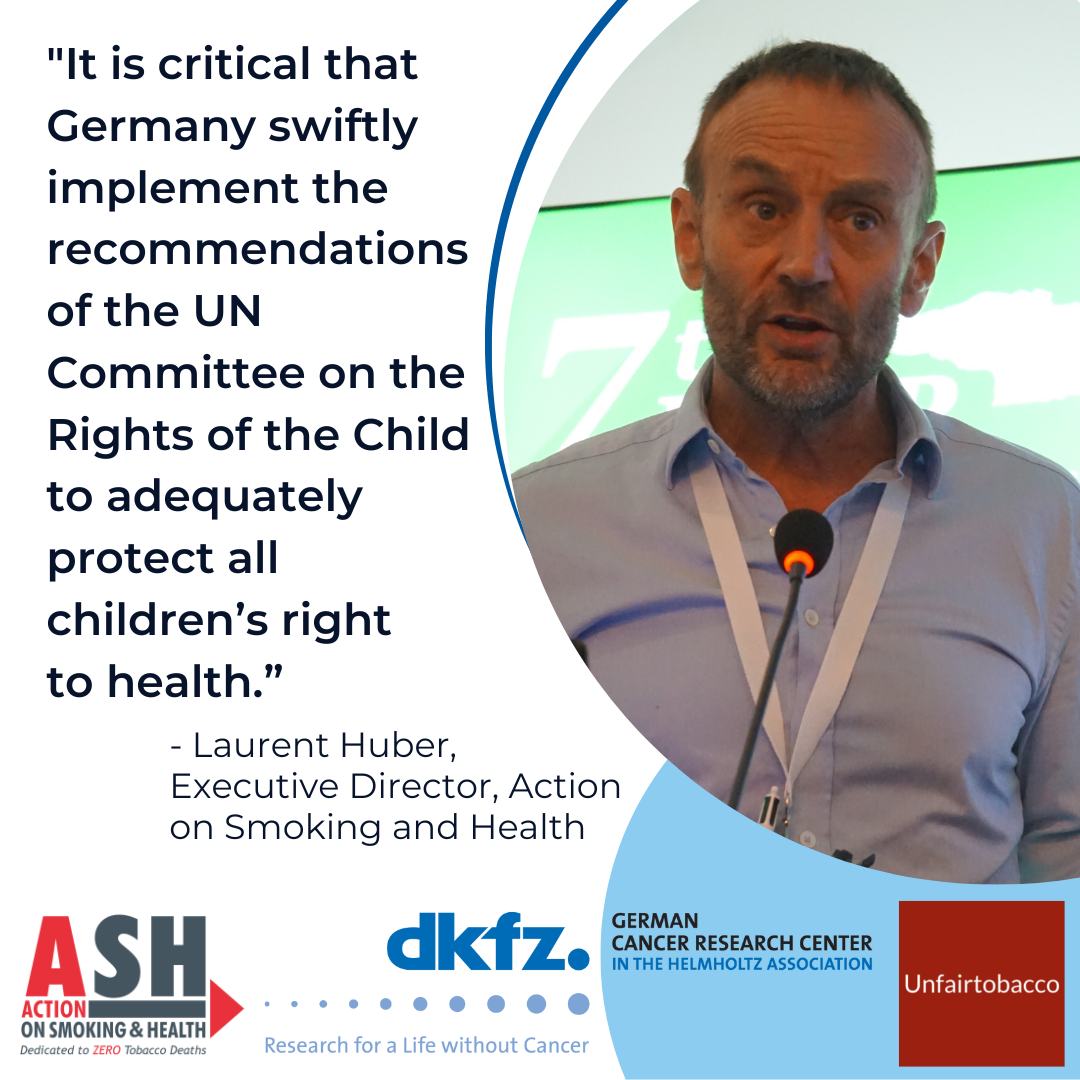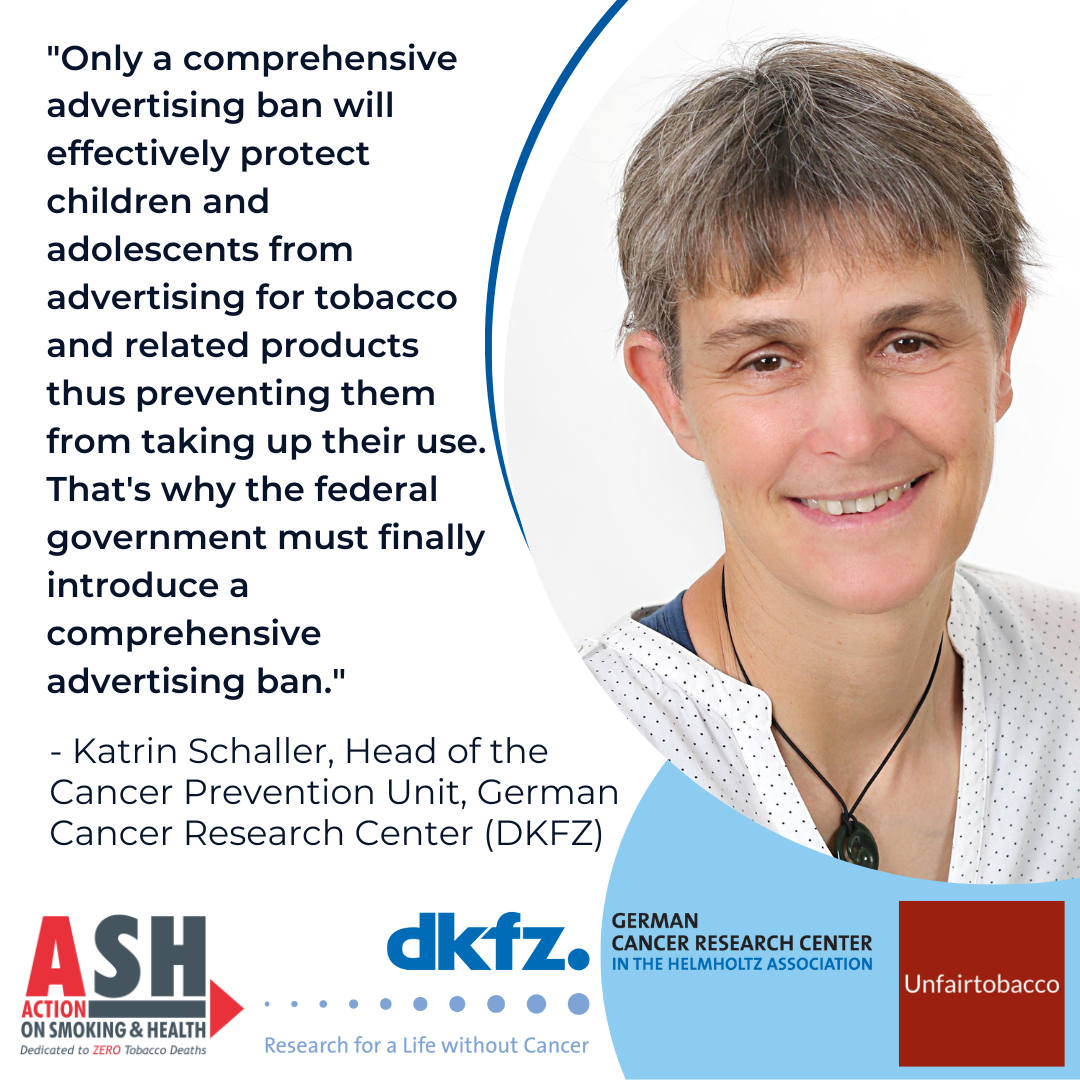
UN Committee calls on Germany: Protect children from second-hand smoke, tobacco advertising and child labour
Joint Statement from Action on Smoking and Health (ASH), the German Cancer Research Center (DKFZ) and Unfairtobacco who submitted parallel reports to the UN Committee calling for these recommendations
 BERLIN, GERMANY and WASHINGTON, DC, USA – OCTOBER 13, 2022 – The UN Committee on the Rights of the Child (UN CRC) issued bold and concise recommendations for the German government to protect children from the tobacco industry violating their rights. The UN CRC recommends that Germany improves education on the effects of tobacco use and second-hand smoke, regulates the marketing of tobacco to children, and holds tobacco companies accountable for infringing on children’s rights in supply chains.
BERLIN, GERMANY and WASHINGTON, DC, USA – OCTOBER 13, 2022 – The UN Committee on the Rights of the Child (UN CRC) issued bold and concise recommendations for the German government to protect children from the tobacco industry violating their rights. The UN CRC recommends that Germany improves education on the effects of tobacco use and second-hand smoke, regulates the marketing of tobacco to children, and holds tobacco companies accountable for infringing on children’s rights in supply chains.
These recommendations come as a result of the ongoing reporting process on the UN Convention on the Rights of the Child which requires treaty parties to report on their status upholding the elements of that treaty, in particular, to respect, protect and enforce the rights of children.
When countries are due to report, civil society organizations also have the opportunity to submit reports to the treaty body on that country’s treaty implementation. Founded in 2018 and supported by ASH, the German Network on Children’s Rights and Tobacco Control has been involved in this reporting process. It submitted several statements to the UN Committee to complement the German State Report, most recently in August 2022.
Engagement from civil society organizations like the German Network on Children’s Rights and Tobacco Control, the German Cancer Research Center, Unfairtobacco, and ASH strengthens the implementation of these human rights treaties and ensures stronger protections for our human rights. Now, this civil society engagement has borne fruit – for the first time, specific recommendations to strengthen protections from tobacco were issued.
The UN CRC’s direct recommendations on tobacco control are:
- […]
(c) Conduct awareness-raising activities for parents, including pregnant mothers, on the harmful effects of substance abuse and second-hand smoke on children’s health;
(d) Regulate the marketing of tobacco to children and continue to strengthen measures to provide adolescents with information on preventing substance abuse, including of tobacco and alcohol, and to ensure the early identification and adequate referral of adolescents requiring treatment for substance abuse;
The UN CRC’s recommendation on child labour in supply chains is:
- […]
(a) Ensure the legal accountability of business enterprises and their subsidiaries operating in or managed from the State party’s territory in relation to international and national human rights, labour, environmental and other standards;
Read the full UN CRC Concluding Observations report here.
Laurent Huber, Executive Director of Action on Smoking and Health (ASH), an organization dedicated to reducing the negative impact of tobacco on global health and development praised the UN CRC, “for calling on Germany to do more to protect the right of German children from the tobacco industry which has been recognized as a major obstacle to achieving the highest attainable standard of health. Because of its inadequate measures to protect its citizens from tobacco companies, Germany received the lowest score out of 36 European countries in the latest Tobacco Control Scale in Europe Report, suggesting that Germany is more interested in protecting the interest of tobacco companies than the right to health of its citizens. It is critical that Germany reverse this trend and swiftly implement the recommendations of the Committee on the Rights of the Child to adequately protect all children’s right to health.”
 Katrin Schaller, Head of the Cancer Prevention Unit at the German Cancer Research Center (DKFZ), clarifies, “In Germany, advertising for tobacco products, e-cigarettes and heated tobacco products is still permitted at the point of sale. These products may be promoted as attractive life-style items for young people. Tobacco companies are allowed to sponsor national festivals thus luring adolescents into tobacco use. Only a comprehensive advertising ban will effectively protect children and adolescents from advertising for tobacco and related products thus preventing them from taking up their use. That’s why the federal government must finally introduce a comprehensive advertising ban.”
Katrin Schaller, Head of the Cancer Prevention Unit at the German Cancer Research Center (DKFZ), clarifies, “In Germany, advertising for tobacco products, e-cigarettes and heated tobacco products is still permitted at the point of sale. These products may be promoted as attractive life-style items for young people. Tobacco companies are allowed to sponsor national festivals thus luring adolescents into tobacco use. Only a comprehensive advertising ban will effectively protect children and adolescents from advertising for tobacco and related products thus preventing them from taking up their use. That’s why the federal government must finally introduce a comprehensive advertising ban.”
Sonja von Eichborn, Director of Unfairtobacco, emphasizes, “While expressing its appreciation on the recent German corporate due diligence act, the UN Committee explicitly calls on the German government to hold companies legally accountable for violations of children’s rights in their supply chain. This must also apply to the beginning of the supply chain, because children have a right to be protected from exploitation and health harms. The supply chain act needs to be strengthened to be effective against hazardous child labour in tobacco fields.”
German Network on Children’s Rights and Tobacco Control
Founded in 2018, the German Network on Children’s Rights and Tobacco Control aims to achieve a tobacco-free world by 2040. Currently, around 30 organisations and experts working on public health, children’s rights and sustainable development are members of the alliance. They work ad hoc and in changing constellations on common campaigning activities, events and publications.
Action on Smoking and Health
Founded in 1967, Action on Smoking and Health (ASH) is America’s oldest anti-tobacco organization, dedicated to a world with ZERO tobacco deaths. Because tobacco is the leading cause of preventable death worldwide, ASH supports bold solutions proportionate to the magnitude of the problem. https://ash.org
German Cancer Research Center
The German Cancer Research Center (DKFZ) is the largest biomedical research institute in Germany. Its more than 3,000 employees, of which more than 1,200 are scientists, are investigating the mechanisms of cancer, are identifying cancer risk factors and are trying to find strategies to prevent people from getting cancer. https://dkfz.de
Unfairtobacco
Unfairtobacco is a project of the Berlin Working Group on Environment and Development (BLUE 21) and exposes how the tobacco industry harms farmers, consumers and the environment. It was recognized with a WHO World No Tobacco Day Award in 2017. https://unfairtobacco.org
Reports and statements of the German Network on Children’s Rights and Tobacco Control
Video report of a school class (May 2020)
Written Statement (February 2021)
Action on Smoking and Health’s Tobacco and Human Rights Hub
Advocacy Tools for the Fight for the Right to Health
Contacts
Megan Manning | +1 202.390.9513 | manningm@ash.org | Action on Smoking and Health
Sonja von Eichborn | +49 1511 5590 191 | eichborn@unfairtobacco.org | Unfairtobacco
Katrin Schaller | +49 6221 42-3016 | k.schaller@dkfz.de | German Cancer Research Center
Supporting organizations of the submissions to the UN CRC
Action on Smoking and Health (ASH), BLUE 21 / Unfairtobacco, European Network for Smoking and Tobacco Prevention (ENSP), FACT e.V. – Women Against Tobacco, Friedensband, German Cancer Research Center (DKFZ), German Centre for Addiction Issues (DHS), German Children‘s Fund (Deutsches Kinderhilfswerk, DKHW), German Lung Foundation, German NCD Alliance DANK, German Network for Tobacco free Healthcare Services (DNRfK), German Respiratory Society (DGP), German Society of Pediatric Allergology (GPA), Health Care Plus, Institute for Therapy and Health Research (IFT Nord), Kindernothilfe (Supporting Children in Need), Smokefree Partnership (SFP), Vivantes Hospital, VIVID – Institute for the Prevention of Addiction